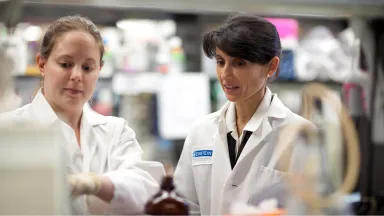
Leonard H. Augenlicht, Ph.D.
- Professor, Department of Oncology (Medical Oncology)
- Professor, Department of Medicine (Oncology & Hematology)
- Professor, Department of Cell Biology
Phone
Location
- Albert Einstein College of Medicine Jack and Pearl Resnick Campus 1300 Morris Park Avenue Ullmann Building 909A Bronx, NY 10461
Research Profiles
Professional Interests
Len Augenlicht heads the Colon Program, and serves as Associate Director for Translational Research, of the Albert Einstein Cancer Center. The colon group, located at the Montefiore Medical Center, consists of 5 laboratories headed by independent investigators (L. Augenlicht, A. Velcich, B. Heerdt, J. Mariadason, L. Klampfer and E. Lin) that collaborate on studies focused on mechanisms that establish and maintain normal homeostasis of the intestinal mucosa, perturbations that lead to tumor development, and in translating this research to patient populations for modulation of risk for cancer, early detection of disease, and rational approaches to therapeutic intervention. In addition to grants that fund individual projects of the investigators, the group was designated by the NCI as a Center for the investigation of Nutritional-Genomic Interactions in Cancer, reflecting its focus on genetic mechanisms and their interaction with environmental signals as determinants of disease risk and progression.
Research areas address how normal cell maturation and lineage specific differentiation are regulated along the crypt-luminal axis of the intestinal tract: the nature of the intrinsic and extrinsic signals that regulate these processes, and the pathways and mechanisms recruited. The use of novel mouse genetic models is a common theme, including mice in which pathways of cell cycle regulation and differentiation are genetically altered. Particular attention is paid to the role of signaling and regulatory pathway organization as a function of crypt architecture, since the sequence of events from the crypt stem cell, through the transit amplifying population, into the zone of differentiation determine the probability of tumor formation. Important discoveries have been:
- localization of expression and function of the cyclin dependent kinase inhibitor p27kip1 to the proliferative compartment of the crypt, where it regulates the progression of cells through the cell cycle (Augenlicht)
- tumor formation by inactivation of Muc2, the gene that encodes the major colonic mucin by a mechanism not involving elevation of Wnt signaling (Velcich)
* the role of c-myc/p53 interaction in determining response to 5-fluoruracil (Augenlicht)
* gene expression profiles for predicting sensitivity to preventive and therapeutic agents (Mariadason) - the role of ras signaling in response of intestinal epithelial cells to extrinsic signals (Klampfer)
- the fundamental role of mitochondria and the mitochondrial membrane potential in regulating cell maturation pathways, cell phenotype, and cell responsiveness to extrinsic signals (Heerdt)
- the transcriptional reprogramming of intestinal epithelial cells during their migration and maturation along the crypt luminal axis, including mechanisms of transcriptional regulation through chromatin remodeling and transcriptional pausing (Mariadason, Velcich, Klampfer, Augenlicht)
Current research areas include how nutrients in the diets of western populations which are at high risk for colon cancer alter pathways that perturb intestinal homeostasis, and in particular, modulation by calcium and vitamin D3 intake (Augenlicht, Velcich, Klampfer); the role of Notch signaling, and its interaction with other pathways such as Wnt, ras and Klf4 signaling, in cell maturation, lineage specific differentiation and tumor formation (Augenlicht, Velcich, Klampfer); the role of epigenetic mechanisms such as DNA methylation, histone and other nuclear protein acetylation, and transcriptional pausing in the normal maturation of intestinal epithelial cells and alterations that lead to cancer (Mariadason, Velcich, Klampfer, Augenlicht); identification and mechanisms of predictive markers of drug response (Mariadason); and the role of the mitochondrial membrane potential in regulating cell phenotype (Heerdt).
A major intersection of interests in the group is the role of inflammation in colon tumor development and progression. In multiple mouse dietary and genetic models of intestinal cancer developed by Augenlicht, Velcich, and Lin, inflammation is associated with tumor development, perhaps linked to altered intestinal microbial populations. Recent experiments by Klampfer and by Lin have identified signals from the macrophage to epithelial cells as important in disruption of mucosal homeostasis and epithelial growth regulation. The mechanisms that cause the inflammation, the role of the inflammatory response in tumorigenesis, and its modulation of inflammation by nutrients and pharmacological agents are under investigation.
Selected Publications
Augenlicht, L.H., Taylor, J., Anderson, L. and Lipkin, M. (1991). Patterns of gene expression which characterize the colonic mucosa in patients at genetic risk for colonic cancer. Proc. Natl. Acad. Sci. USA 88, 3286 3289.
Augenlicht, L.H., Wadler, S., Corner, G., Richards, C., Ryan, L, Multani, A.S., Pathak, S., Benson, A., Haller, D., and Heerdt, B.G. (1997). Low-level c-myc amplification in human colonic carcinoma cell lines and tumors: a frequent, p53 independent, mutation associated with improved outcome in a randomized clinical trial. Cancer Res., 57, 1769-1775.
Mariadason, J.M., Corner, G.A., and Augenlicht, L..H. (2000). Genetic reprogramming in pathways of colonic cell maturation induced by short chain fatty acids: comparison with trichostatin A, sulindac, and curcumin, and implications for chemoprevention. Cancer Research, 60,4561-4572.
Yang, W.C., Velcich, A., Mathew, J., Edelmann, W., Kucherlapati, R., Lipkin, M., Yang, K., and Augenlicht, L.H. (2000). Targeted inactivation of the p21WAF1/cip1 gene enhances Apc initiated tumor formation and the tumor promoting activity of a western-style high risk diet by altering cell maturation in the intestinal mucosa. Cancer Research, 61, 565-569.
Mariadason, J.M., Bordonaro, M., Aslam, F., Shi, L., Kuraguchi, M., Velcich, A.., and Augenlicht, L.H. (2001). Down regulation of the B-catenin-TCF pathway is linked to colonic epithelial cell differentiation. Cancer Res. 61,3465-3471.
Arango, D., Corner, G.A., Wadler, S., Catalano, P.J. and Augenlicht, L.H. (2001) c-myc/p53 interaction determines sensitivity of human colon carcinoma cells to 5-fluorouracil in vitro and in vivo. Cancer Res. 61, 4910-4915.
Augenlicht, L.H. and Heerdt, B.G. (2001). Mitochondria: integrators in tumorigenesis? Nature Genetics 28, 104-105.
Yang, WC., Velcich, A., Mariadason, J., Nicholas, C., Corner, G., Houston, M., Edelmann, W., Kucherlapati, R., Holt, P.R., and Augenlicht, L.H. (2001). p21WAF1/cip1 is an important determinant of intestinal cell response to sulindac in vitro and in vivo. Cancer Research, 61, 6297-6302.
Velcich, A., Yang, W., Heyer, J., Fragale, A., Nicholas, C., Viani, S., Kucherlapati, R., Lipkin, M., Yang, K., and Augenlicht, L. (2002). Tumor formation in mice with genetic inactivation of the major gastrointestinal mucin gene, Muc2. Science, 295, 1726-1729.
Mariadason, J.M., Arango, D., Corner, G., Aranes, M., Hotchkiss, K., Yang, WC., and Augenlicht, L.H. (2002). A gene expression profile that defines colon cell maturation in vitro. Cancer Research, 62, 4791-4804.
Wilson, AJ, Velcich, A., Kurland, AR, Shenoy, SM., Pezo, RC., Levsky, JM, Singer, RJ., and Augenlicht, LH. (2002). Novel detection and differential utilization of a c-myc transcriptional block in colon cancer chemoprevention. Cancer Res. 62, 6006-6010, 2002.
Heerdt, B.G., Houston, M.A., Wilson, A., and Augenlicht, L.H. (2003). The intrinsic mitochondrial membrane potential is associated with steady state mitochondrial activity and the extent to which colonic epithelial cells undergo butyrate mediated growth arrest and apoptosis. Cancer Res. 63, 6311-6319.
Yang,WC., Bancroft, L., Nicholas,C., Lozonschi, I., and Augenlicht, L.H. (2003). Targeted inactivation of p27kip1is sufficient for large and small intestinal tumorigenesis in the mouse, which can be augmented by western-style high-risk diet. Cancer Research, 63, 4990-4996.
Klampfer, L., Huang, J., Corner, G., Mariadason, J., Arango, D., Sasazuki, T., Shirasawa, S. and Augenlicht, L. (2003). Oncogenic k-ras inhibits the expression of IFN-responsive genes through inhibition of STAT1 and STAT2 expression. Jour. Biol. Chem. 278, 46278-46287.
Mariadason, J.M., Arango, D., Shi, Q., Wilson, A.J., Corner, G.A., Nicholas, C., Aranes, M.J., Lesser, M., Schwartz, E.L., and Augenlicht, L.H. (2003) Gene expression profiling-based prediction of response of colon carcinoma cells to chemotherapeutic agents. Cancer Research, 63, 8791-8812.
Klampfer, L., Huang, J., Swaby, L-A, and Augenlicht, L. (2004). Requirement of histone deactylase activity for signaling by STAT1. Jour. Biol. Chem. 279,30358.
Klampfer, L, Huang, J., Sasazuki, T., Shirasawa, S. and Augenlicht, L. (2004). Oncogenic Ras promotes butyrate-induced apoptosis through inhibition of gelsolin expression. Jour. Biol. Chem. 279,36680.
Velcich, A., Corner, G., Paul, D., Laboisse, C., and Augenlicht, L. (2005). Quantitative rather than qualitative differences in gene expression predominate in intestinal cell maturation along distinct lineages. Exp. Cell Res. 304,28-39.
Yang, WC, Bancroft, L., and Augenlicht, L.H. (2005). Methylation in the p21 promoter of
Apc+/-,p21+/- mice, and lack of response to sulindac. Oncogene 24, 2104.
Mariadason, J.M., Nicholas, C., L’Italien,K.E., Zhuang,M., Smartt,H., Heerdt, B.G., Wang, WC., Corner, G.A., Wilson, A.J., Klampfer, L., Arango, D., and Augenlicht, L.H. (2005). ). Gene expression profiling of intestinal epithelial cell maturation along the crypt-villus axis. Gastroenterology 128, 1081-1088.
Yang,WC, Velcich,A.,Lozonschi,I.,Liang,J.,Nicholas,C.,Zhuang,M.,Bancroft.,and Augenlicht,L.H. (2005) Inactivation of p21WAF1/cip1 enhances intestinal tumor formation in Muc2-/- mice. Am. J. Pathol. 166, 1239.
Klampfer,L.,Swaby,L-A.,Huang,J.,Sasazuki,T., Shirasawa,S., and Augenlicht,L. (2005). Oncogenic Ras increases sensitivity of colon cancer cells to 5-FU-induced apoptosis. Oncogene, (18 April), 1-10.
Yang, WC, Bancroft, L., and Augenlicht, L.H. (2005). p27kip1 in Intestinal Tumorigenesis and Chemoprevention in the Mouse. Cancer Research, 65, 9363-9368.
Heerdt, BG, Houston, M., and Augenlicht, L.H. (2005). The intrinsic mitochondrial membrane potential of colonic carcinoma cells plays a role in defining the probability of tumor progression. Cancer Research, 65, 9861-9867.
Heerdt BG, Houston MA, and Augenlicht LH. (2006). Growth properties of colonic tumor cells are a function of the intrinsic mitochondrial membrane potential. Cancer Res. 66, 1591-6.
Wilson, A., Byun, D-S., Papova, N. Murray, L.B., L’Italien, K., Sowa,Y., Arango, D., Velcich, A., Augenlicht, L.H., and Mariadason, J.M. (2006). Histone deacetylase 3 (HDAC3) and other class I HDACs regulate colon cell maturation and p21 expression and are deregulated in human colon cancer J. Biol. Chem. 281, 13548-13558.
Smartt, HJM, Guilmeau,S, Nasser, S., Nicholas, C., Bancroft, L, Nasser, SV, Simpson, SA, Yeh, N, Yang, W-C, Mariadason, JM, Koff, A, and Augenlicht, L.H. (2007). p27 regulates cdk2 activity in the proliferating zone of the mouse intestinal epithelium: potential role in neoplasia. Gastroenterology 133, 232-243.
Klampfer, L, Huang, J, Sasazuki, K, Shirasawa,S, and Augenlicht,LH (2007). STAT1-independent inhibition of cyclooxygenase-2 expression by IFNgamma; a common pathway of IFNgamma-mediated gene repression but not gene inactivation. Oncogene, 26, 2071-2081.
Stampelj, M., Kedinger, M., Augenlicht, L., and Klampfer, L. (2007). Essential role of the JAK/STAT1 signaling pathway in the expression of inducible nitric-oxide synthase in intestinal epithelial cells and is regulation by butyrate. J. Biol. Chem. 282, 9797 – 9804.
Klampfer,L, Huang, J., Shirasawa,S., Sasazuki,T., and Augenlicht, L. (2007). Histone deacetylase inhibitors induce cell death selectively in cells that harbor activated kRasV12: the role of signal transducer and activator of transcription 1 (STAT1) and p21. Cancer Research, 67, 8477-8485.
Jhawer, M, Goel,S, Wilson, AJ, Montagna,C., Ling,YH, Byun,D-S, Nasser,S, Shin,J, Klampfer, L, Augenlicht,LH, Perez-Soler,R, and Mariadason,JM (2008) PIK3CA/PTEN mutation status predicts response of colon cancer cells to the EGFR
inhibitor cetuximab. Cancer Res., in press.
Kaler, P., Sasazuki, T., Shirasawa,S., Augenlicht,L. and Klampfer,L. (2008). HDAC2 deficiency sensitizes colon cancer cells to TNFá-induced apoptosis through inhibition of NF-êB activity. Exp. Cell Res., in press.





